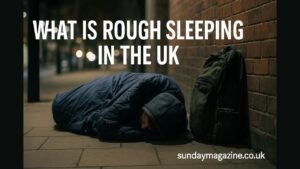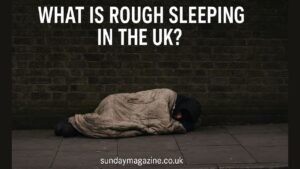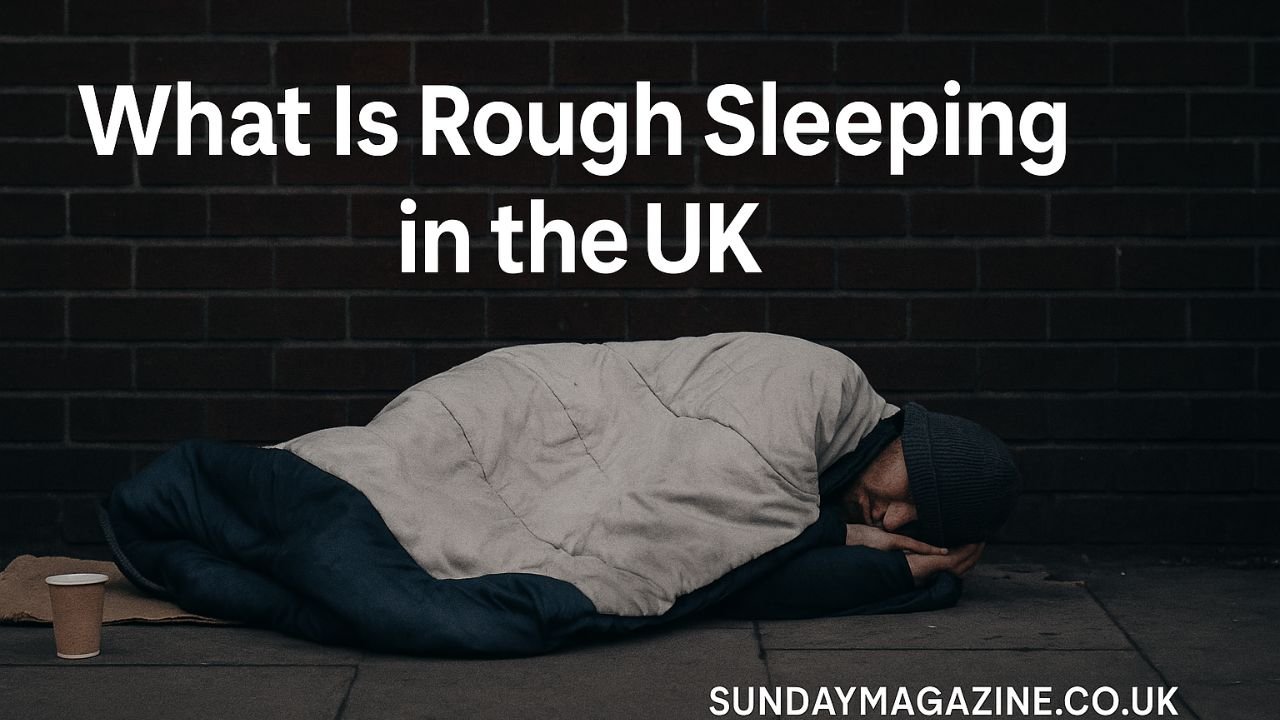Discover what is rough sleeping in the UK means, its causes, and the latest statistics. Learn about the impact of rough sleeping, government initiatives, and available support for rough sleepers. Explore solutions to tackle homelessness in the UK.
Rough sleeping is one of the most pressing social issues in the UK, affecting thousands of people each year. The definition, causes, and implications of rough sleeping are multifaceted, and it’s essential to understand this complex issue fully. In this article, we’ll answer key questions, such as: What is rough sleeping in the UK? How does it differ from other forms of homelessness? Is rough sleeping illegal in the UK? And many more.
Through a comprehensive analysis, we will discuss rough sleeping statistics, the situation in cities like London, and provide insights into the support systems available for rough sleepers. Let’s dive deep into this issue.
ALSO READ: 5 Clever Ways to Hide an Oreo: Food Network Inspired Ideas
What Is Rough Sleeping in the UK?

Rough sleeping refers to individuals who sleep outdoors, typically in public spaces like streets, parks, or bus stops, without a shelter or a fixed, safe place to sleep. Rough sleepers are visible members of society but often go unnoticed in the rush of everyday life. In the UK, rough sleeping has been a growing concern in recent years, affecting not only large cities like London but also smaller towns across the country.
Rough Sleeping Meaning
The term “rough sleeping” specifically refers to people who are forced to sleep outside, usually due to a lack of accommodation or other support options. It does not include people who may be temporarily staying with friends or family or those in temporary housing. Rough sleeping can involve anything from sleeping under bridges, in doorways, or in makeshift shelters on the streets.
What Is Rough Sleeping Definition
In the UK, rough sleeping is defined by the Ministry of Housing, Communities and Local Government (MHCLG) as “people who are sleeping, about to bed down (sitting or lying down), or doing so in the open air.” It is distinct from other forms of homelessness, such as “sofa surfing,” where people stay with friends or relatives temporarily. Rough sleeping is widely recognized as the most visible form of homelessness.
Why Is Rough Sleeping on the Rise in the UK?
The increase in rough sleeping across the UK has been linked to a variety of factors, including a shortage of affordable housing, mental health issues, addiction problems, and cuts to social welfare programs. The rise in rough sleeping is also attributed to an increase in eviction rates, and economic insecurity exacerbated by the COVID-19 pandemic, making the problem even more widespread.
Factors Contributing to Rough Sleeping UK
- Housing Shortage: A severe lack of affordable housing in many areas of the UK leaves people with no option but to sleep on the streets.
- Mental Health Issues: A high percentage of rough sleepers suffer from mental health issues, which complicate their ability to seek help or maintain stable housing.
- Addiction: Drug and alcohol addiction are prevalent among rough sleepers and often serve as both a cause and a result of homelessness.
- Economic Factors: Unemployment and low-wage work often make it impossible for individuals to afford housing, leading them to resort to rough sleeping.
Rough Sleeping Statistics in the UK
According to the latest statistics from the UK government, rough sleeping has steadily increased in recent years. The rough sleeping statistics show that in 2019, approximately 4,266 people were recorded as rough sleepers across England, which was a significant rise from previous years.
How Bad Is Rough Sleeping in London?
London, as the capital city, has the highest number of rough sleepers in the UK. In 2019, rough sleeping statistics revealed that over 1,000 people were sleeping rough on the streets of London alone. The city’s higher cost of living, limited affordable housing, and large population all contribute to this issue. However, the situation is not unique to London—rough sleeping is also visible in cities like Manchester, Birmingham, and even smaller towns.
Is Rough Sleeping Illegal in the UK?
A common misconception is that is rough sleeping illegal UK. However, rough sleeping is not illegal in the UK. It is not a criminal offense to sleep on the streets, but local authorities have implemented measures to manage the issue. These can include policies like offering shelter spaces, but at times, police may move individuals along for safety or health reasons.
Legal Framework Regarding Rough Sleeping
While rough sleeping itself isn’t criminal, certain activities associated with it, like begging, can be penalized. Some local councils use anti-social behavior orders (ASBOs) or other legal means to discourage rough sleeping in particular areas, but these actions are aimed at ensuring safety and not targeting the individuals themselves.
The Impact of Rough Sleeping
Rough sleeping has serious physical, mental, and social consequences. People who sleep rough are exposed to the elements and are at high risk for health issues, including hypothermia, malnutrition, and infectious diseases. Furthermore, rough sleeping is linked to higher rates of mental health conditions, such as depression, anxiety, and post-traumatic stress disorder (PTSD).
Long-Term Consequences of Rough Sleeping
- Health Risks: Constant exposure to cold, rain, and other environmental factors can lead to chronic health problems.
- Mental Health Struggles: The trauma of living on the streets can exacerbate pre-existing mental health issues or lead to new conditions.
- Social Exclusion: Rough sleepers often face societal stigma and discrimination, which can make it harder for them to find stable housing or employment.
What Support Is Available for Rough Sleepers in the UK?

Several government initiatives and charities aim to support rough sleepers in the UK. These services include emergency shelters, outreach programs, and long-term accommodation options.
Government Initiatives for Rough Sleepers
The UK government has introduced several programs to combat rough sleeping, such as the Rough Sleeping Initiative, which focuses on providing emergency accommodation and support to help people transition into long-term housing solutions.
Charitable Organizations
Charities like Crisis, Shelter, and The Big Issue provide essential support, including temporary housing, food, and legal assistance. Many of these organizations work in partnership with local authorities to help individuals find stability.
What Can Be Done to End Rough Sleeping in the UK?
Ending rough sleeping requires a comprehensive approach, combining immediate support for individuals with long-term strategies to address the root causes of homelessness. Some solutions may include:
- Affordable Housing: Building more affordable homes to address the housing crisis.
- Mental Health and Addiction Services: Expanding services to address the mental health and addiction issues that contribute to rough sleeping.
- Employment Opportunities: Creating job opportunities for people who are homeless to help them rebuild their lives.
Conclusion
Rough sleeping in the UK is a complex issue that requires a multifaceted solution. While there is no easy fix, increased support from both the government and charitable organizations is essential. Providing affordable housing, better mental health care, and employment opportunities can all help reduce the number of people who find themselves on the streets.
FAQs
1. What is rough sleeping in the UK?
Rough sleeping in the UK refers to individuals who sleep outdoors, typically in public spaces like streets, parks, or doorways, without access to stable accommodation or shelter.
2. Is rough sleeping illegal in the UK?
No, rough sleeping itself is not illegal in the UK. However, activities like begging or certain behaviors associated with rough sleeping may be subject to legal actions in some areas.
3. How many rough sleepers are there in the UK?
According to recent statistics, over 4,000 people were recorded as rough sleepers in England in 2019, with London having the highest number of rough sleepers.
4. What are the causes of rough sleeping in the UK?
It is caused by a combination of factors, including a lack of affordable housing, mental health issues, addiction problems, and economic insecurity.
5. What support is available for rough sleepers in the UK?
Support for rough sleepers includes emergency shelters, outreach programs, and long-term housing solutions provided by government initiatives and charitable organizations like Crisis and Shelter.





